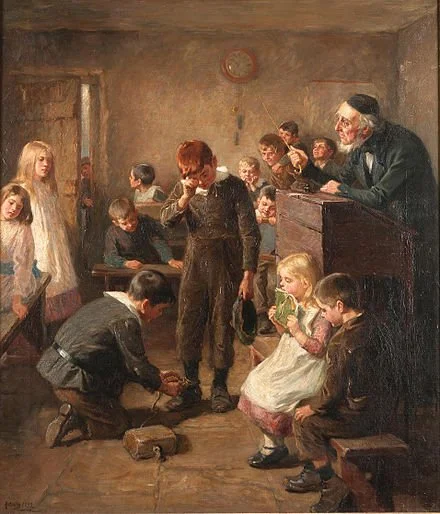Chris Powell: Teacher raises always fail to reduce poverty in Connecticut
The Truant's Log,” by Ralph Hedley (1899)
MANCHESTER, Conn.
Hardly a week passes without revealing more evidence that poverty is worsening in Connecticut.
As an emergency measure, all public school students in Connecticut are now eligible for free or discounted school lunches for the current school year. But this month it was reported that the number of students who would qualify under the old rules increased by 4% in the year ending last October. The number of students not able to speak English increased by 10%. These data points are the key measures of poverty used by state government for allocating state money to school systems.
Predictably enough, most of both increases involved children in Connecticut's ever-struggling cities.
While the number of state students qualifying for free school lunches had fallen in the prior two years, this seems to have been only because of the federal government's temporary tax credit for people with children. It's not that students suddenly were able to pay for their own lunches but that government was paying for them in a different way. The self-sufficiency of poor families did not increase.
People who consider themselves advocates for children assert that the new data calls for state government to "invest" another $300 million in education in the cities. Actually the new data suggest that state government's long practice of "investing" more in urban education has failed to achieve any substantial increase in learning or any substantial reduction in poverty.
But failure in education and poverty policy long has been the rationale for doing still more of what has failed.
All the extra money "invested" in urban education probably has failed because it has been spent mainly on increasing the compensation of teachers and administrators. The extra money has not made disadvantaged children any more prepared to learn when they get to school, nor has it made their households much less poor and their upbringings much better.
Indeed, though the virus epidemic is long over, chronic absenteeism in Connecticut's schools has risen to an average of 25% and is closer to 50% in the cities. Standardized test results show that student proficiency in Connecticut has been collapsing for more than 10 years. The education and poverty problems have endured no matter how much money has been thrown at them.
But for political reasons this failure of policy has never been audited.
This doesn't mean that teachers are to blame. They play the hand they are dealt -- indifferent, unparented and sometimes incorrigible students. School administrators who stick to such pernicious policies as social promotion and the suspension of discipline are partly to blame. But the problem is still bigger than that -- social disintegration and proletarianization, which begin long before children get to school, and quite without government's objection.
The legislation proposed by a few far-left Democrats in the General Assembly to require people to vote seems to presume this proletarianization -- to presume that the many people who don't vote and the many who don't even register to vote would vote Democratic if they were required to vote, since the Democrats are the party of enlarging government to dispense ever more free stuff and patronage and to increase dependence on government.
The mandatory-voting legislation raises questions that its advocates have yet to answer.
Could the mandatory voting requirement be met by filing a form affirming that a person is aware of an election but doesn't want to vote for anyone?
What would be the penalty for refusing to vote or to file the opt-out form?
Would mandatory voting apply to everyone or only to those people registered to vote?
Would a mandatory voting requirement discourage people from registering to vote in the first place?
Perhaps most important, why would requiring everyone to vote necessarily improve politics, government, and public life?
After all, for years now, half of Connecticut's high school graduates have failed to master high school math and English, most have lacked a basic knowledge of civics, and many carry this ignorance through life. They are being prepared mainly to become lifelong dependents of government.
Of course even the ignorant and uninformed have the right to vote. But why push it so hard?
Chris Powell is a columnist for the Journal Inquirer, in Manchester. (CPowell@JournalInquirer.com)
